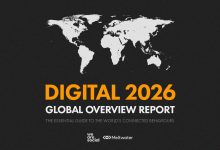JAPAN — In December 2020, Dentsu Inc. (Headquarters: Minato-ku, Tokyo; President & CEO: Hiroshi Igarashi) and Dentsu Institute (Office: Tokyo; Executive Producer: Naoki Tani), an internal organization of Dentsu Group Inc., conducted a survey on attitudes to social good among users of social media in the five countries of Japan, UK, US, China, and India.
A positive attitude to social good refers to a willingness to support activities and products that have a beneficial impact on society. In recent years, worldwide attention has focused on efforts to curb CO2 emissions, reduce plastic waste, and promote equality in terms of gender and race. The objective of this survey was to establish how attitudes to social good differ among countries and how they relate to use of social media. The main findings are as summarized below.
Summary:
- In all countries, more than half of respondents supported activities promoting social good, but in Japan the affirmative response rate was somewhat lower.
- In all countries, positive attitudes to social good were high among the cohort that posts on social media at least once a week.
- Differences in attitudes to social good in Japan were associated more closely with frequency of social media posting than gender or age.
Findings:
- In all countries, more than half of respondents supported activities promoting social good, but in Japan the affirmative response rate was somewhat lower.For all five statements expressing positive attitudes toward corporate activities promoting social good, the mean affirmative response rate for the five countries combined was high, at over 60%.In Japan, the affirmative response rate was lower than in the other countries, and was particularly low with regard to statement 3, “I try to buy products from companies and brands that improve the environment and society” and statement 5, “I try to choose products with low environmental impact and fair trade products even if they are a little expensive.”

- In all countries, positive attitudes to social good were high among the cohort that posts on social media at least once a week.Across all five countries, users who post at least once a week*2 showed positive attitudes to social good.
 In Japan, 45% of social media users posted at least once a week, the lowest among the five countries surveyed. However, the tendency for users who post at least once a week to have positive attitudes to social good was observed in Japan as in the other countries.
In Japan, 45% of social media users posted at least once a week, the lowest among the five countries surveyed. However, the tendency for users who post at least once a week to have positive attitudes to social good was observed in Japan as in the other countries.

- Differences in attitudes to social good in Japan were associated more closely with frequency of social media posting than gender or age.In Japan, a marked difference was observed between users who post at least once a week and users who post less than once a week with regard to statement 3 and statement 5; this difference was greater than gender- or age-based differences.

 Notes:
Notes:
*1 Social media is taken to include social networking services, video-sharing platforms and apps, and messenger apps.
*2 Users who post at least once a week were defined as follows:
– In Japan, UK, US, and India- Users who posted at least once a week on either Facebook, Instagram, Twitter, or TikTok (excluding direct messaging)
– In China
- Users who posted at least once a week on either WeChat, Weibo, RED, or Douyin (excluding direct messaging)
Methodology
Title: Survey on Attitudes to Social Good (covering Japan, UK, US, China, and India)
Survey method: Online questionnaire
Conducted by: Dentsu Inc. and Dentsu Institute
Survey period: December 13-21, 2020
Survey areas: Japan, UK, US, China, India
Target: Social media users aged 15-64 in the five countries
(i.e., people who have used social networking services, video-sharing sites or apps, or messenger apps)
Effective sample size: 2,624
(Japan: 537, UK: 531, US: 525, China: 500, India: 531)
The sample was adjusted after collection of responses to eliminate bias among countries in terms of the number of respondents, and their genders and ages.

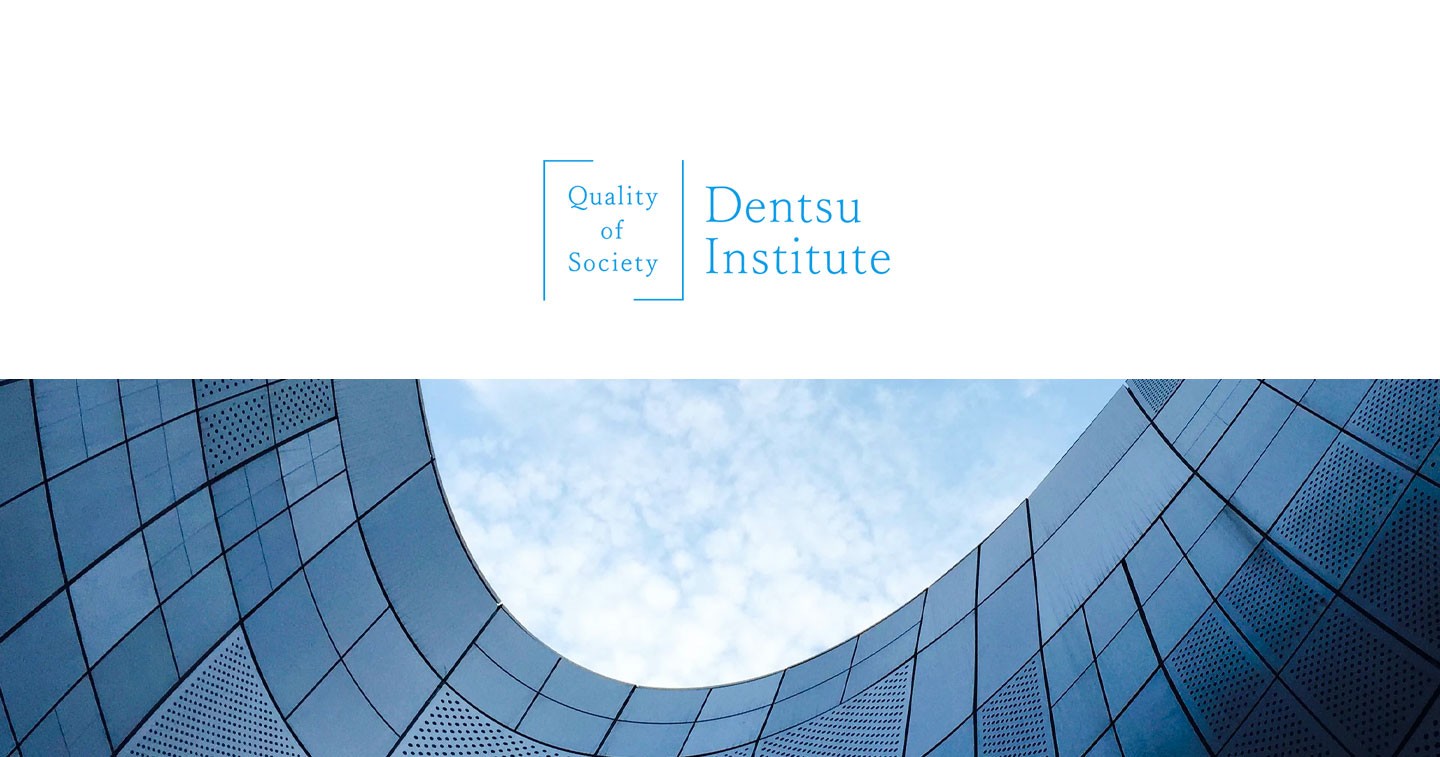
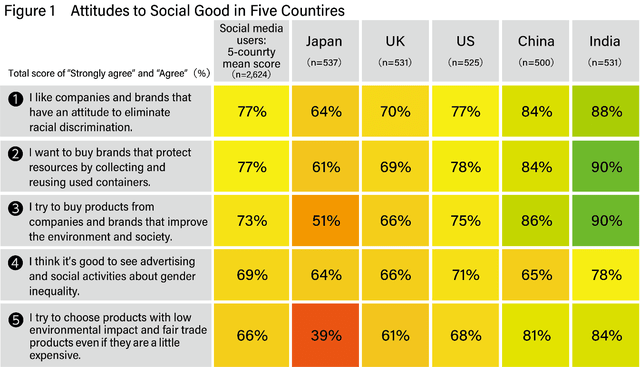
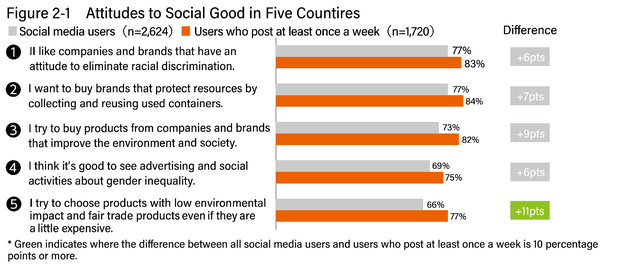 In Japan, 45% of social media users posted at least once a week, the lowest among the five countries surveyed. However, the tendency for users who post at least once a week to have positive attitudes to social good was observed in Japan as in the other countries.
In Japan, 45% of social media users posted at least once a week, the lowest among the five countries surveyed. However, the tendency for users who post at least once a week to have positive attitudes to social good was observed in Japan as in the other countries.
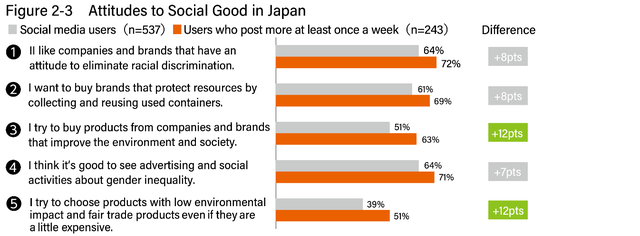
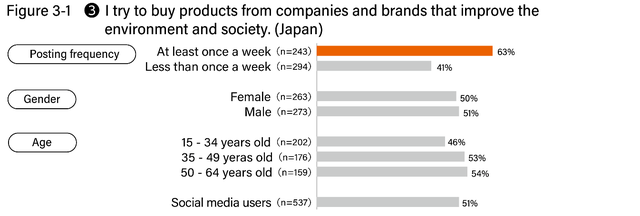
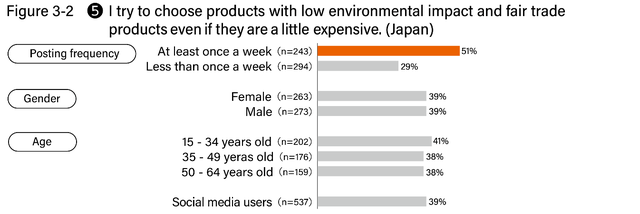 Notes:
Notes:




